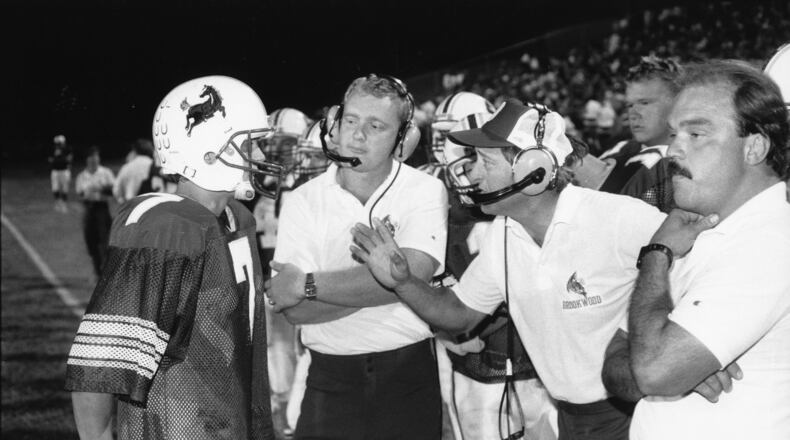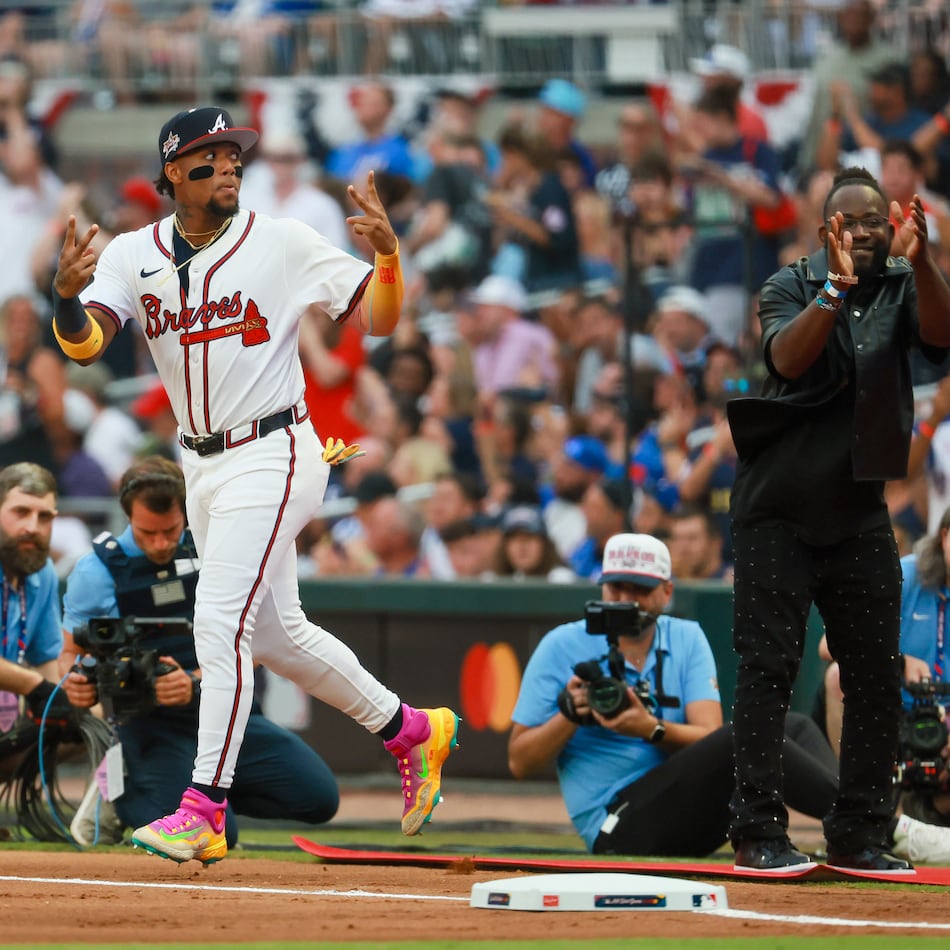What he did: With the high school football season kicking off Friday night, Dave Hunter will enter his 49th year as one of Georgia's biggest power brokers when it comes to the sport.
Hunter no longer coaches nor is an athletic director, but continues to help guide football, from his very popular Corky Kell Classic to being a member of the executive committee for the Georgia High School Association.
But it all began in Knoxville, Tenn.
The son of a printer, Hunter played basketball and baseball at Fulton High School, his football career cut short because of injuries. He went to East Tennessee State to play basketball on a scholarship, but switched to baseball and went back home to the University of Tennessee.
He played center field for the Volunteers for two seasons before packing his bags and heading to Atlanta in 1966, beginning his career here as a coach and physical-education teacher at East Cobb Junior High School. The school was across the street from Wheeler High School, where Hunter began his relationship with legendary Wildcats coach Corky Kell.
Hunter then moved to Ridgeview High in Fulton County as an assistant and coached the great Jimmy Robinson, who would go on to become a star receiver at Georgia Tech and a successful NFL assistant coach. He was there for two years before going back to get his masters at Tennessee and returned to Georgia as the offensive coordinator at Chamblee High, where he said he coached his greatest player ever, that being linebacker Andy Spiva, who would go on and become a star at Tennessee and play for the Falcons.
In 1976, Hunter went to Peachtree High to coach for T. McFerrin and became the head coach in 1983, going 27-16-2 in four seasons. At that point, Brookwood had been in existence for five years and finished 1-9 in ’86 under Bruce Stephens, which prompted the school to hire Hunter.
There, he found his niche and built one of the best programs in the state, going 149-35 in 15 years including making the playoffs 12 times, winning five region titles and eclipsing the 10-win mark nine times.
At the same time as the school’s AD, Hunter began to build influence on the GHSA executive committee and throughout the state. He focused his program on fundraising and had a fieldhouse built as well as a lodge for team supporters.
Along with Kell at Wheeler, the two started what would become the Corky Kell Classic, which featured the first football games played in the Georgia Dome. Kell died in 1994 and on his deathbed asked Hunter to keep the game alive. He has and Friday the Corky Kell Classic entered its 24th season, having gone from two games to seven and televised regionally on SportSouth.
But for Hunter, the year to remember was 1996, when he went to Valdosta and won Brookwood’s first state championship, a 45-24 whipping of the Wildcats in their own backyard.
For health reasons, which came from watching film until 3 in the morning, Hunter retired after the 2001 season and stepped down as the AD in December 2007. But he has continued to do work for the GHSA, perhaps the key voice in reclassification along with his partner Earl Etheridge from Valdosta.
He also continues to help other schools build and raise money for their programs and spends a lot of time on the telephone mentoring younger coaches.
The field at Brookwood was named in his honor and in 2013 he was the first football coach inducted into the Gwinnett Sports Hall of Fame, joining Jason Elam, his former kicker at Brookwood who went on to star for the Denver Broncos.
Hunter has also been instrumental in the building of the Gwinnett Touchdown Club as more than 600 attend the banquet every year.
Where he lives: Hunter, 70, lives Lawrenceville and been married to Beverly for 18 years. They have four children and five grandchildren.
What he does now: Along with the Corky Kell Classic which includes a kickoff lunch and 7-On-7 Tournament, Hunter runs the very popular Elite Junior Classic All-Star Game each December. He also just finished working on the new reclassification for the state as Georgia. Beginning in the 2016 school year will now have a total of seven classes plus Class A which is split into public and private for the playoffs. But his favorite day of the month these days is the one Thursday he spends with other retired coaches eating breakfast at Sweet Baby James in Lawrenceville. They go for the buffet.
On coming to Georgia from Tennessee: "It was 1966 and the Braves and Falcons were coming to Atlanta. I knew Atlanta was the place to be for sports so I took the job at (now) East Cobb Middle. I graduated from college on a Friday and was here on a Saturday. I slept at the clinic across the street at Wheeler High School for three weeks.''
On coaching Spiva at Peachtree: "He was the best player I ever coached. He was a tackling machine. He still has the all-time career record for tackles at Tennessee.''
On his success at Brookwood: "I always tell people we built a village at Brookwood. It started with the administration, and they let me hire eight guys so I could have a solid staff. The parents then jumped on board, and we built a stadium in our third year. Who ever has heard of a school building a stadium back then in their third year? We built a strong booster club, and the people in the neighborhood are very special. Whenever there is a crisis or death, they come running.''
On beating the mighty Wildcats of Valdosta on their home field in the state championships: "We didn't complete a pass in that game. We ran it down their throats and played great defense. There was a point in the third quarter where we ran the same two plays the rest of the game. Let's just say it was a very short trip back to Atlanta.''
On the Corky Kell Classic: "It was December in 1994 and I was visiting Corky and he was sick in the bed and I asked him if there was anything I could do for him. He said in a raspy voice: 'Keep the game going. Keep the game going.' I said OK. I will. I will. He reached up and grabbed my shirt and pulled me down to his face and looked me dead in the eye from a foot away and said, 'Promise me.' So I said I promise. And I will continue to honor that promise for as long as possible.''
On how football has changed since he coached: "It was probably more of a grind back then, more physical. I am not saying it is better or worse; there are just new ways to do things these days.''
On his once-a-month coaches breakfast: "We have two rules: You have to have coached football and be retired and you are welcome to come.''
On the business of football: "I don't think I am expert at fundraising. I did it out of necessity. We were the first to do a lot of things in Gwinnett like paint our end zones. I remember Kevin Maloof was coaching at Meadowcreek and when he walked on our field and saw how good it looked he told me they were already 10 points down. We tried a lot of things at Brookwood. I always feel you have to jump off the diving board and make sure the water was all right.''
On being a dealmaker in the GHSA: "I do try to compromise. Some people feel I am a little gruff, but I try to see both sides of the story. People think Earl Ethridge and I fight like cats and dogs, but he drove four hours from Savannah Thursday to come up to the Corky lunch. That's the type of person he is and the relationship we have. And when former players call me it thrills my soul.''
On going to see Elam kick at Denver: "He came to Brookwood once to a game and came in the locker room and wanted to know why I had never seen him play in the NFL. I booked a flight on Monday.''
On missing coaching on Friday nights: "It makes your stomach hurt when you are doing it, but there is nothing better. I do like what coach (Bobby) Bowden (at Florida State) said when he said the low of losing is much greater than the high of winning.''
On which coaches he looked up to: "I always like the way coach (Tom Landry of the Dallas Cowboys) handled himself. I used to get on my players in practice but I tried to stay calm in the game because I knew the players were looking at me and were going to behave the way I did.''
On the high school talent in Georgia: "If you talk to the college recruiters, Georgia is one of the top four or five states in the country when it comes to high school football. I think it is a testament to three things: spring practice, the quality of the coaches and the commitment of the schools. In Gwinnett County, football is really important. I think that is true all through the state.''
About the Author
Keep Reading
The Latest
Featured

